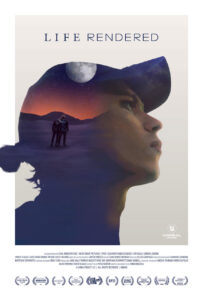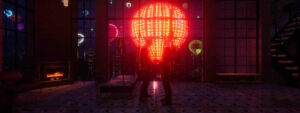
Oscar Qualifying Short Film Review “Life Rendered”
WATCH THE TRAILER HERE
First, the Recap:
The tapestry of existence. The search for meaning. The desire to truly be seen for who we strive to be. This encompasses the ever-fluctuating actuality that is LIFE and all it contains for us, both in joy and hardship. Yet, when we find ourselves on the cusp of discovery and personal fulfillment only to still feel the need to hide it away for fear of rejection or judgement, how can we hope to figure out the path of least resistance to tread? A young man named Mark (Owen Teague) faces this challenge daily as he spends his waking hours between working to care for his crippled former cowboy father Sage (Luce Rains) and the family business while also pursuing love and attachment within a virtual reality realm he’s created, hoping to maintain appearances outside of it while delving fully into it digitally thanks to his friend Kane (Armen Taylor). The questions then present themselves–Can this charade last forever? Or will it be uncovered for the world to know?
Next, my Mind:
Fantastical but still formidable, surreal yet undeniably grounded, creatively complex yet emotionally accessible, thematically relevant yet wholly relatable for anyone to take in, consider, and apply to their own journeys, this 24-minute Oscar-qualifying short film from writer/director/producer Emma Needell, writer Ryan Barton, producers Eric Day, Patrick Hackett, and Jake Sally plus executive producers Karen Dufilho, Miles Perkins, Owen Teague, Zeda Stone, Josh Gold, James Kelly, and Nigel Tierney confronts one of the most commonly covered subject matters currently depicted in entertainment and with an acutely deft touch blurs the lines between the real and unreal worlds we inhabit, both figuratively and literally, in order to deliver a stirringly heartfelt message about the lengths we go to to both hide who we are and then encountering the catalysts for allowing it to finally surface. This beautifully stylized approach is the heartbeat of true cinematic artistry and why short film is a medium that needs so much more recognition.
Intelligently utilizing both live action and gorgeously presented animation to draw us in, the narrative finds a young man fighting for his identity and need to be loved via escaping daily into a realm that doesn’t actually exist, the fellow traveler he meets there, and the ramifications of pushing too hard out of desperation, even as his real life is burdened with obligations beyond his control that he dutifully carries out despite the evident frustration and emptiness of it. Familial commitments, searching for aspiration and inspiration, the potency of memory, the yearning for acceptance and validation, the death of dreams, the awe of revelation, freedom in fantasy, a parent’s unconditional love for their child, and the utter necessity of reconnection all get purposefully explored alongside what this critic feels becomes the foundational premise conveyed which is that to find oneself, do we intentionally feel the urge to disavow reality for a facade believing we’ll heal or is it total denial in not wanting to face what we know we must?
However you might choose to interpret what you witness in the film, there’s absolutely NO escaping the poignantly orchestrated third act that brings us to a finale which in its simplicity speaks grander, persuasive volumes to what has already occurred and does so without feeling forced or blatantly “obvious” even if you might ascertain how things will end as the film progresses. As hinted at above, the visual execution here really works wonders to elevate the film’s messages and overall appeal by intermixing the physical with the virtual, which does very effectively create a tangible and calculated separation of realities that assists in immersing us in BOTH and in a manner through each that adds further punch to the narrative’s themes. Additionally, it illustrates through its imagery how we tend to create something of worth but then potentially destroy it through rash actions, finding ourselves desolate and wishing to restore what we’ve now pushed away. Plus, the animated sequences are so lush and vibrant thanks to today’s incredible CGI technology. Likewise, the music score employed throughout the film is deeply emotive and atmospheric in the best of ways, emerging in just the right moments to have the most influence on given sequences and our senses.
Teague dominates the proceedings, though not remotely in any kind of overbearing way, via voice, animated, and physical presence through his role as Mark, a young man only attempting to find and be comfortable with himself while in the midst of playing caretaker for a disabled father and helping run the family business in rural Colorado. As often as possible, he sees liberation in the artwork he sketches that then gets translated into the virtual reality world he’s created which serves as a meeting point for himself and a fellow “player” with whom he enjoys a close relationship with. But, when things take a sudden turn due to a hasty decision on Mark’s part, it puts things into a tailspin until his father makes a discovery of his own that will alter both of their lives forever. It’s a perfectly credible, understated, yet dramatically forceful performance Teague provides, taking us through every level of volatility and uncertainty Mark experiences with poise and sincerity that does full justice to the film’s intent and thematic direction.
Luce elicits the kind of empathetic/sympathetic reactions one would expect or at least anticipate through his role as Sage, Mark’s father and former cowboy now having to endure a painful and lasting reminder of what his moments in the arena cost him even as his son must now play both caretaker and worker for him due to being mostly incapacitated. Making moves to rectify his own circumstances while being the firm but loving father his son needs, Sage has an awakening of his own that will cause the relationship between himself and Mark to either implode or become stronger and more supportive, perhaps even a balm for them both to alleviate their respective inner pain. There’s a calm but keenly delivered, palpable fervency in Luce’s performance that allows Sage’s character to be totally believable. The primary supporting role arrives via the voice and virtual character-only appearance of Taylor as Mark’s unreal friend in the imaginary world, Kane, who could be more than just a trusted and fun companion in Mark’s mind, both in VR and IRL.
The other supporting appearance is made by Casey Andree as a local landscaper Mark has a brief interaction with. So, in total, “Life Rendered” is a highly original, boldly significant, unequivocally timely and pertinent exploration of how we choose to contend and cope with the apprehensions of just being US in a world that’s so quick to pass judgement, but that also offers opportunity for redemption, healing, and the magnificent release of personal reconciliation, manifesting an inner emancipation that won’t require something UN-real to find happiness, contentment, and devotion.
As always, this is all for your consideration and comment. Until next time, thank you for reading!





